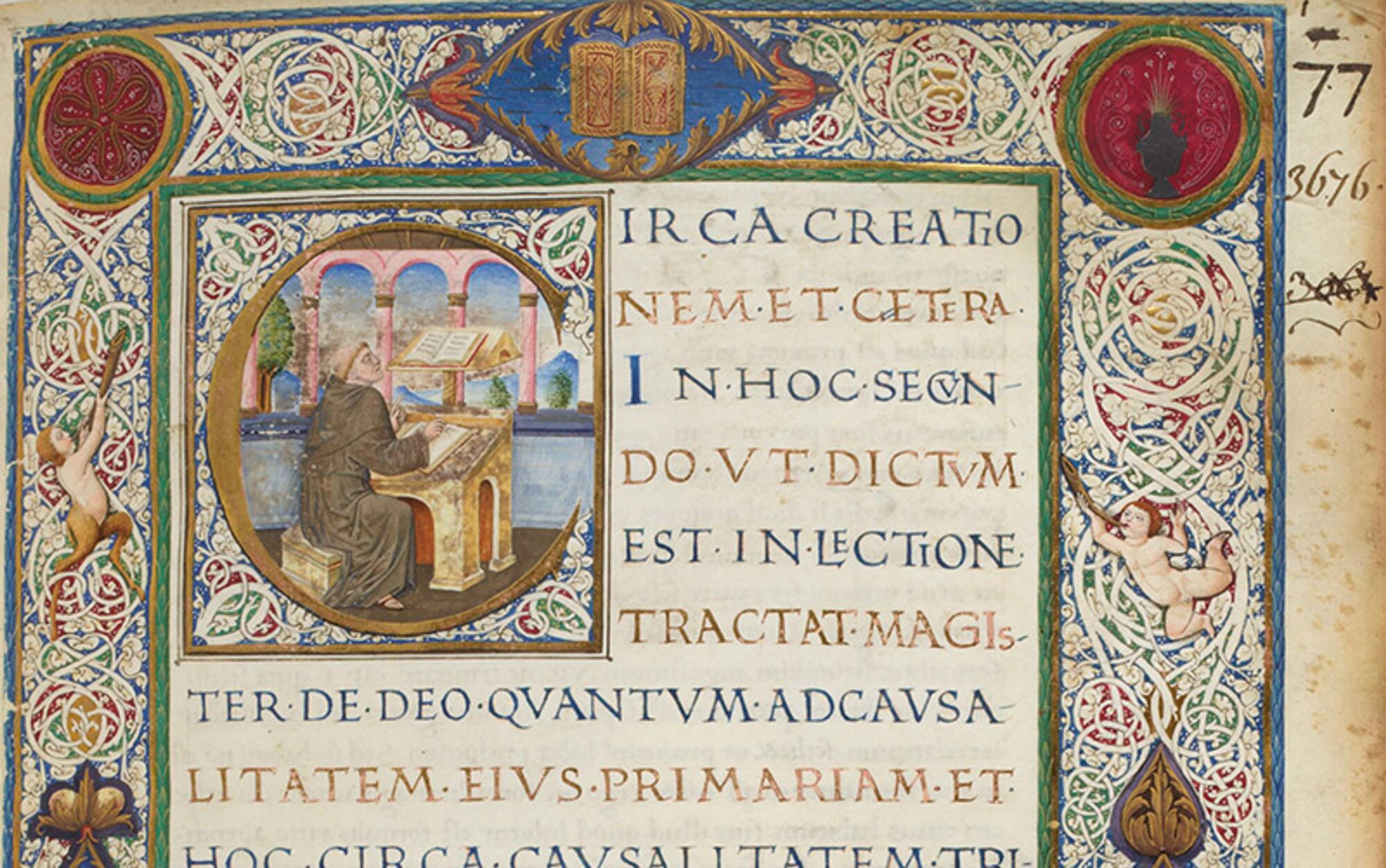I am not nearly old enough to remember dunce caps, but I do remember a pedagogical illustration of a sad little boy sitting in the corner of a classroom wearing a pointy hat while his peers gaze joyfully at their teacher. My teacher explained that the pointy hat was called a dunce cap, and was used in olden times to humiliate and so punish the dunces, that is, the students who cannot or will not learn their lessons. Our own lesson was clear: we might not have the pointy hats anymore, but only sorrow and ostracisation await children who do poorly in school.
Ironically, John Duns Scotus (c1265-1308), after whom the dunces are named, did very well in school, impressing his Oxford Franciscan colleagues so much that they sent him to the University of Paris. His brilliance at Paris eventually earned him the temporary but prestigious post of Regent Master of Theology. His writings, despite their difficulty, were enormously influential in Western philosophy and theology, so much so that universities all over Europe established Chairs of Scotist thought side by side with Chairs dedicated to Thomism. In the 19th century, the Jesuit poet Gerard Manley Hopkins declared that it is Scotus ‘who of all men most sways my spirits to peace’, and halfway through the 20th century the celebrity monk Thomas Merton could say that Duns Scotus’s proof for God’s existence is the best that has ever been offered.
This prestigious legacy notwithstanding, as early as the 16th century educated Englishmen were appropriating ‘Duns’ as a term of abuse. In 1587, the English chronicler Raphael Holinshed wrote that ‘it is grown to be a common prouerbe in derision, to call such a person as is senselesse or without learning a Duns, which is as much as a foole.’ But in the same age a bookish person might also be labelled a dunce: ‘if a person is given to study, they proclayme him a duns,’ John Lyly explains in his Euphues: The Anatomy of Wit (1578). Humanist contempt of scholastic methods and style – of which Scotus’s own tortuous texts sometimes read like a parody – is probably an adequate explanation of the unfortunate union of ‘fool’ and ‘studious’ in ‘dunce’. A person must be a fool to waste time reading John Duns Scotus!

From Super secundo libro Sententiarum (c1475-1500) by John Duns Scotus. Courtesy the BnF, Paris
Scotus remains a polarising figure, but his humanist detractors would be horrified to learn that here in the 21st century we are witnessing a Scotus revival. Philosophers, theologians and intellectual historians are once again taking Scotus seriously, sometimes in a spirit of admiration and sometimes with passionate derision, but seriously nonetheless. Doubtless this is due in part to the progress of the International Scotistic Commission, which has in recent years completed critical editions of two of Scotus’s monumental works of philosophical theology: Ordinatio and Lectura. As these and other works have become more accessible, Scotus scholarship has boomed. According to the Scotus scholar Tobias Hoffmann, 20 per cent of all the Scotus scholarship produced over the past 70 years was produced in the past seven years. This explosion of interest in Scotus offers as good an occasion as any for introducing this brilliant and enigmatic thinker to a new audience.
Some of Scotus’s theological concerns are bound, at first glance, to seem irrelevant to secular readers, but theology for Scotus was both a subject in its own right and the context in which to engage in distinctively philosophical activity: from the problem of universals to the grounds of moral authority, from the mind-body relation to the relations between mind, word and world, from the intelligibility of religious language to rational proofs of God’s existence, Scotus has something interesting to say in most of the major contemporary subfields of philosophy.
Of his life, there is, sadly, not much we can say. Probably he was born in the town of Duns in Scotland, in 1265 or 1266. He got involved in the Franciscan movement as a boy, and his Franciscan superiors sent him to their house of studies in Oxford, perhaps around 1280. There he studied the liberal arts and went on to study theology. He was ordained a priest in 1291.
By the early 1290s, he had made his first steps as a professional theologian, lecturing at Oxford on Peter Lombard’s Sentences, a standard textbook of theology that served as a de facto syllabus for theology courses at the universities of Oxford and Paris throughout the 13th and 14th centuries. But he also began what was to be a lifelong side interest in writing on Aristotle, producing commentaries on most of the logical works, and at least beginning commentaries on On the Soul and Metaphysics, which he later finished at Paris.
Why Scotus was sent there is not known. Also unknown is the cause of his untimely death
He continued lecturing on the Sentences after his move to Paris sometime before the start of the academic year in 1302. The published versions of these lectures form the bulk of his literary output. We have three distinct versions: the early Lectura, completed and published at Oxford; the middle Ordinatio, started at Oxford; and the later Reportationes, a chaotic collection of student reports on Scotus’s lectures. Of these, the Ordinatio is the most polished and is the closest we have to a complete commentary by Scotus on the Sentences – ‘ordinatio’ itself means, roughly, ‘carefully edited’.
In 1303 he was temporarily exiled from Paris for his support of Pope Boniface VIII over King Philip IV in their dispute over taxation of Church properties. It is not known what Scotus did during this exile, but probably he returned to Oxford and may have spent at least part of the time lecturing at Cambridge. After a year, he was able to return to Paris, where, in 1305, he finally earned his doctorate in theology and presided for a couple of years as the Regent Master of Theology. During his Regency, Scotus conducted a ‘quodlibetal dispute’, a formal academic event at which members of the audience could ask the Master questions on any topic whatsoever. Scotus later published a set of Quodlibetal Questions based on this dispute.
In 1307, Scotus left Paris and took up the far less prestigious post of lector at the Franciscan house of studies in Cologne. A lector at such a house would have the primary teaching responsibility of the friars residing in that house. Compared with the Franciscan house at Paris, let alone the University of Paris, the Franciscan house at Cologne was a backwater. Why Scotus was sent there is not known. Also unknown is the cause of his untimely death in 1308, about a year after arriving in Cologne.
It is, of course, disappointing to have so few details of Scotus’ life. And yet in this very lack there is a lesson about what Scotus’s life was really about. We do not know why he was sent to Cologne at the height of his Parisian success, but we do know that it is very Franciscan to shun worldly acclaim. Scotus was, after all, a Franciscan friar, and the religious order St Francis founded is officially called the order of the Little Brothers of Francis, as a testimony to the poverty and humility they aspired to. It is easy to imagine Scotus the Franciscan willingly taking on a job in Cologne that would result in less time to write, fewer opportunities to dazzle influential peers in philosophical disputation, and hence less fame and prestige than he would have had by staying at Paris.
Given his vocation as a Franciscan friar and a priest, it comes as little surprise that God’s existence and nature, and how we ought to live in light of God, were the central (but not only) topics of Scotus’s philosophical work. But it would be a mistake to think of Scotus’s philosophical efforts as so many attempts to rationalise previously settled dogma – this would be unfair to Scotus, given the extremely high argumentative standards he set for himself.
He was confident that we can know God’s existence by the unaided work of natural reason
One dogma that he thought philosophy could demonstrate was the existence of God. As a Catholic theologian, he believed by faith that God exists, but he also thought that philosophy, or natural reason, could demonstrate that there is a supreme nature that is the first cause of everything else, is the ultimate purpose for which everything else exists, and is the most perfect being possible. Moreover, this supreme nature has an intellect and will, and so is personal, and has all the traditional divine attributes such as wisdom, justice, love and power. In short, Scotus thinks that philosophy, unaided by theology, can demonstrate God’s existence.
His case is elaborate, developed over 30,000 words in his Tractatus de primo principio – a work I recently translated and wrote a commentary on (forthcoming this year with Hackett Publishing Company) – a virtuosic exercise in the high scholastic style. It develops a sort of hybrid argument influenced by both Aristotelian-Thomistic ‘cosmological’ arguments that approach God from the causal structure of the world, and Anselmian ‘ontological’ arguments that try to establish God’s actual existence from peculiar features of the idea of God. It is widely regarded by specialists as the most rigorous effort to prove God’s existence undertaken in the medieval period.
But while Scotus was confident that we can know God’s existence and many divine attributes by the unaided work of natural reason, he did not think we can, in this way, know everything that there is to know about God. As a Christian, Scotus believed that God is a ‘Trinity’ of divine persons – three persons sharing the one divine nature. But he did not think that we could know this fact about God apart from divine revelation. He extended this intellectual modesty to other distinctively Christian doctrines such as the resurrection of the dead: he thought that philosophy can show that it is probable that human beings have immortal souls, but that belief in the resurrection of the dead (and so the reunification of souls with bodies) is something believed by faith – not opposed to reason but not discoverable by reason.
While Scotus thought that some of his religious commitments could not be proved by reason, he did not think that his religious commitments contradicted anything that reason could show to be true. In this respect, Scotus is an heir of the long tradition of Christian thought that affirms the harmony of faith and reason. Here Scotus is in lockstep with Thomas Aquinas: both think that God’s existence can be demonstrated but that God’s being a Trinity cannot.
Scotus and Aquinas were not in lockstep on every topic, however. One of the most infamous differences between these two great medieval thinkers concerns their views about how our words and concepts work when we try to think and speak about God. Each believed that our thought and language develop from our experience of the world around us. And each recognised that God is not among these familiar objects of experience. So, for both thinkers, it is equally important to offer some sort of theory about how it is that we can think and speak coherently and meaningfully about God using concepts and words tailored to finite, sensible things. Aquinas adopted the view that, applied to God, our concepts and words have only analogous meaning. For example, ‘wisdom’ as applied to God is only analogously related to ‘wisdom’ as applied to a creature, such as Socrates.
Scotus offered a slightly different theory. He argued that at least some of our words and concepts have exactly the same meaning when applied to God as they have when applied to creatures – they are ‘univocal’ (same in meaning), not merely analogous. ‘Being’ itself is the most important of these univocal concepts and terms. Scotus thinks that when we say ‘God is a being’ and ‘Socrates is a being’, ‘being’ has exactly the same meaning in the one as in the other.
Scotus affirms that this is exactly the gap that yawns between creatures and God
To some, this view is startling, even scandalous. Influential writers like Amos Funkenstein and John Milbank think that Scotus’s doctrine of univocity caused monumental changes to Western society. In The Unintended Reformation (2012), Brad Gregory argues that univocity led to the ‘domestication of God’s transcendence’ and the rise of secularism, an ontological flattening in which God and creatures are metaphysically on par, where God is just one more theoretical entity among many, able to be discarded if alternative scientific theories explain data better than theological alternatives. As the sciences progressed and found less and less need of God, religious belief and practice found itself more and more relegated to a subjective realm of feelings and blind faith. Eventually, the sciences, now operating on totally naturalistic assumptions, were given sole responsibility for describing the world objectively.
Whether one welcomes or laments these societal changes, the dunces know that Scotus cannot be responsible for them. To hold that we human beings possess a concept that applies equally to God as it does to creatures does not entail or even remotely suggest that God exists just like creatures exist. Scotus’s controversial doctrine of univocity is, at worst, harmless for theology.
To see this, it is important to keep in mind that Scotus’s doctrine of univocity is itself undergirded by a theory of concepts according to which most of our concepts are themselves complex, able to be analysed down into simpler conceptual components. For example, the most general concept we have by which to think about a creature, as a creature, is finite being. This complex concept does not apply to God. But the complex concept infinite being does apply to God – in fact, it is, according to Scotus, the most adequate concept we have (by natural reason alone) for thinking about God. And infinite being, of course, applies to no creature.
But notice that each of these concepts – finite being and infinite being – is complex, and each includes being as a simple conceptual component. So, on Scotus’s view, if something is a finite being, then it is a being; and, likewise, if something is an infinite being, then it is a being. At this simplest conceptual level, we have just one concept of being that applies to God and creatures. There cannot be a greater ‘gap’ than that between finite and infinite – and Scotus affirms that this is exactly the gap that yawns between creatures and God. But this gap has nothing to do with the fact that the concepts finite being and infinite being share the simple conceptual component of being as such. If Scotus’s doctrine of univocity is to be faulted, therefore, it cannot be for failing to mind the gap between God and creatures. Relevant criticism might take issue with his theory of complex concepts that gives rise to his theory of univocity – but that is a topic for philosophy of mind and philosophy of language, not theology.
Scotus declares over and over again that God is the highest good, indeed goodness itself, and that God is truth itself. Given his understanding of how our concepts work when we apply them to God – univocally, as we saw above – Scotus did not think that, when we call God ‘good’ or ‘true’, we are in the dark about what God’s goodness and truth amount to. Sure, we cannot comprehend the infinity of God’s goodness, but we can be confident that, if it’s true that God is good, then God’s goodness is intelligible to us.
The intelligibility of divine goodness acts as a sort of conceptual constraint to Scotus’s theorising about God’s relationship to morality. In Scotus we find two grounds or sources of moral norms: on the one hand, following Aristotle, Scotus thought that it is evident from the natures of human beings what is good and bad for us, and this sort of ‘natural goodness’ yields a wide range of norms about right or wrong. But on the other hand, Scotus emphasised God’s freedom over the moral order. God’s commands – eg, thou shalt love thy neighbour as thyself; thou shalt not kill – themselves generate moral obligations, and God’s commanding need not track in every way what can be discerned merely by reflection on human nature. Scotus considers the command to Adam and Eve not to eat the fruit of a certain tree in the Garden of Eden – if God had not commanded them not to, it wouldn’t have been wrong. But God’s freedom over morality itself neither negates what we can discover on our own about right and wrong, nor entails that God’s freely instituted moral norms can invert the natural moral order.
Scotus’s traditional insistence that human nature is a source of moral norms is itself supported by his broader realism about universals. In the old dispute, realists hold that there is something real, independent of our thinking, about common natures (nowadays more often called universals). Each of us is a human being, and the humanity we share is itself something real, existing independently of anyone’s forming a concept of humanity. Nominalists, by contrast, deny that common natures like humanity have any sort of mind-independent existence. For them, there are indeed individual humans, but humanity is merely a concept or word. Duns Scotus is one of the more emphatic realists of the Middle Ages, while William of Ockham, a Franciscan who died four decades after Scotus, is probably the most famous medieval nominalist.
Scotus innovates, inventing an entirely new kind of entity: a property that, at most, one thing can have
Realism about common natures gives rise to a philosophical puzzle that the nominalist need not take up: if humanity is something we all share, what makes us the individuals we are? Put another way, if our collective humanity is one, what explains how there are many humans?
It is in answer to this question that Scotus develops his doctrine of ‘haecceity’: each individual belongs to the kind it does due its common nature, but is the individual it is due to its haecceity. ‘Haecceity’ literally means ‘thisness’. It is that feature, unique to each of us, that makes each of us some particular human being. Every other type of property that a thing can have – colour, shape, size, duration, place, and so on – is in principle shareable by something else. Therefore, these shareable properties cannot explain our individuality. So Scotus innovates, inventing (or discovering) an entirely new kind of entity: a property that, at most, one thing can have. Your haecceity is that feature of yours that only you can have.
To see how radical this theory is, consider Thomas Aquinas’ own answer to the question about what individuates things that share a common nature. Aquinas thought that each individual has a particular chunk of matter of a certain quantity, and this chunk of ‘quantified matter’ serves to individuate individual things. So you and I share humanity in common, but I am I because of my matter, and you are you because of your matter.
There is something wholesome and simple about Aquinas’ theory, but Scotus criticises it on the grounds that, even if we suppose that you and I cannot share the same matter at the same time, it remains that matter itself, even some particular quantity of matter, is shareable (even if only at different times) and so is unsuitable for making an individual thing to be the very individual it is. Scotus’s haecceity really is a new kind of thing in the history of metaphysics: something real, something that really characterises the thing that has it – but something that is entirely unique to its bearer.
Scotus’s doctrine of haecceity is yet another of his views in which some have discerned world-historical significance. In A Secular Age (2007), Charles Taylor, inspired by Louis Dupré, said that Ockham the nominalist and Scotus the realist share a focus on individuality that gives ‘a new status to the particular’, and marks ‘a major turning point in the history of Western civilisation, an important step towards that primacy of the individual which defines our culture.’
I confess I am often tempted to make sweeping historical conclusions about the medieval figures I work on. If I could believe them, I might think my research is more important than it is, and conduct my work with extra vigour. In a Taylorian spirit, for example, I might say that Ockham and Scotus, along with their predecessor Aquinas, with the focus on individuals these three share, gave rise to the primacy of the individual that defines our culture. Or, in the same spirit but with a greater sense of boldness, I might say that Aquinas, with his materialistic answer to the problem of individuation, along with Scotus and Ockham, who believed in the existence of matter, together ushered in the pervasive materialism of contemporary science and culture.
It is just as possible for a person of the 21st century as of the 14th to wonder whether God exists
Of course, it would take a reckless frame of mind to believe either of these assertions: the connections drawn between Aquinas, Scotus and Ockham are insufficiently robust to unite them as common causes of the historical events attributed to them. But that’s the point: a theory of nominalism is about individuals in some sense (since it asserts there are only individuals) and so, too, a theory of haecceity is about individuals in some sense (since it asserts an individuating entity in addition to the common nature). But these theories are about individuals in radically different senses, just as Aquinas’s materialistic solution to the problem of individuation is about matter in a sense radically different from the sense in which, say, Thomas Hobbes is a materialist about human minds. Therefore, they should not be lumped together as common causes of the same historical event. Ockham’s denial that there is such a thing as human nature does seem like the sort of denial that would affect the way ordinary people live their lives, if it ever came to influence them. The same can be said of Scotus’s affirmation that there is such a thing as human nature. But it would be rather surprising – and a mere accident – if the denial and affirmation of exactly the same view had exactly the same influence on how people live their lives.
As a Scotus scholar, I welcome this century’s revival of interest in Scotus. But a more fruitful way to indulge that interest, especially for those just starting their intellectual journey with Duns Scotus, is simply to try to take him on his own terms, engaging first-order questions of philosophy and theology with Scotus, and resisting the storyteller’s urge to situate this or that feature of Scotus’s thought within a narrative that explains why we are where we are now. It really is just as possible for a person of the 21st century as it was for a person of the 14th to wonder whether God exists, or whether universals are real, or whether objective morality requires a divine lawgiver. When we ask these questions now, we’re asking the very same questions they were asking then. And, thanks to the efforts of the dunces who for centuries have kept alive Scotus’s memory, editing and transmitting his texts, and writing papers and books trying to explain his thought, we can welcome Scotus into our own puzzlings over these and other perennial questions. At the speed of philosophy, 1308 is not so very far away after all.






